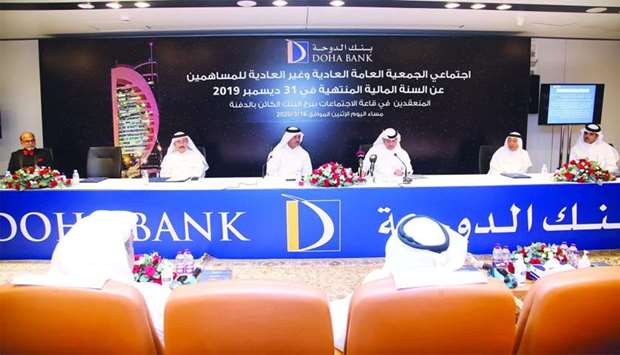Doha Bank is planning to raise capital up to $1bn as part of further strengthening its capital base and to meet its expansion strategy, which includes process reengineering, digitisation and automation, in addition to developing the business intelligence.
The proposed capital enhancement, for which a definite timeframe has not been set, will be either directly undertaken by the bank or through a special purpose vehicle and it could be through Tier I or Tier 2.
A proposal regarding this on Monday got shareholders nod at the annual extraordinary general assembly meeting, which was presided over by Doha Bank chairman Sheikh Fahad bin Mohamed bin Jabor al-Thani.
The issuance, which would qualify as capital instruments, can be through public route or a private placement, in local and/or international markets. It can be in local or major foreign currencies.
The Tier II (debt) would not exceed $500mn or equivalent, Sheikh Fahd said, adding the maturity of the additional Tier I instruments would be perpetual and that of Tier II would be limited to 10 years.
"The bank has taken approval (from shareholders) for us to go for additional Tier I or Tier II of up to $1bn but it would depend upon the market conditions," Doha Bank group chief executive Dr R Seetharaman told reporters on the sidelines.
Stressing that bank needed to strengthen its capital adequacy further, he said at present it stood at 17.6%, which is a good one and that core equity also has moved to 11.5% against the minimum threshold of 9%.
The lender retained the 2019 profit in order to strengthen the shareholders’ equity, which would have a "positive" impact on increasing the capital adequacy ratio and would also enhance the bank’s capacity and its ability to grow its investments and credit portfolios in different business areas. Moreover, it would increase the income of the bank in the coming years, Sheikh Fahd said.
Doha Bank has laid out a five-year policy that focuses on achieving continuous growth in the main income items, improving asset quality, diversifying income sources, particularly non-interest income and effectively monitoring and managing costs in line with the banking industry to optimise the cost of funding as well.
The bank has done reasonably well with the operating income growing by 5.6% and total assets by 11.9% with loan book expanding 9.9%, Seetharaman said, adding investment portfolio has increased by 28%.
Highlighting the bank's efficiency, he said cost-to-income ratio has improved to 33.6% from 35.6% and overall there has been a balanced performance.


